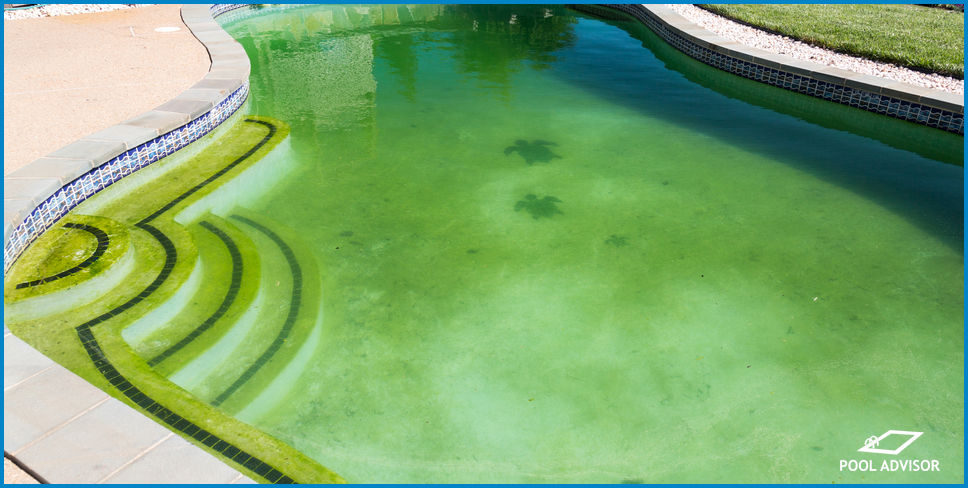
Green Algae In My Pool - Is It Dangerous?
Keen for a dip in the pool but worried about the green tinge in the water? It can send shivers down your spine and your mind racing about whether the green algae in your pool is dangerous or not.
Believe it or not, green algae aren't as deadly as they look.
In saying that, we still don’t recommend jumping in if the water is green. It’s best to treat it as if there are risks should you choose to take a dip. Wait a second, isn’t that a bit contradictory?
Well, let’s find out once and for all if green algae in your pool is dangerous?
Why do green algae appear in my pool?
Like any body of water, a swimming pool is easily exposed to microbes and bacteria growing on the surface. Algae, like any other microorganism, will start growing in your pool if the conditions are right.
Green algae particularly like to form in bodies of water that aren’t well treated. And once it forms, it grows quickly. Especially if a body of water has no proper circulation or outflow to refresh it.
That’s why it grows quickly in pools that aren’t treated properly or maintained correctly.
Signs of green algae
Green algae can be spotted easily by some of the following signs:
- Green slimy streaks in the water
- High pH levels in your pool
- Low chlorine levels in your pool
- Floating clusters on the water surface
Is green algae dangerous?
To be blunt, green algae (much like black algae) is not going to kill you. It is generally non-toxic to humans. But it is not your friend either. There is a myriad of problems that green algae pose such as:
- Harsh skin irritations
- Exposure to nasty bacteria
- Poor depth visibility
These may seem minor issues but they bring about some unpleasant conditions if you are not careful.
Skin Irritations
The biggest issue surrounding exposure to green algae is that it can cause extremely unpleasant lesions on your skin.
These will not only burn after initially forming but will also feel incredibly itchy as they heal. These can also blister and be open to infection if you are not careful.
Bacteria Exposure
Green algae may not be particularly harmful, but the bacteria that eat the algae (and will thrive in a pool with plenty of green algae) can very well be. If you develop a bacterial infection it could cause severe discomfort, including symptoms such as vomiting, fever and diarrhoea.
With some of the nasty bugs including E.coli and legionella, it is always best to avoid being exposed to bacteria and algae whenever possible.
Poor Visibility
What people also forget as well is that pool water covered in green algae will have terrible visibility. This means you won’t be able to gauge the depth of the water if you dive in.
This significantly increases the risk of injury in the water should you try diving in. On top of that, the slimy nature of the algae makes any surface extremely slippery making it easy to slip and injure yourself even if just using the pool steps as normal.
How to treat green algae
Thankfully, green algae are easy to remove from a pool. All you need to do is “shock” it by placing concentrated doses of chlorine into the swimming pool.
This will slowly kill off the living algae which can then be removed from the pool. Green algae is extremely easy to remove as it can be scrubbed off with a brush and collected from water with a net.
Once this is done, your pool should slowly return to crystal clear clarity in just a few days. It’s always worth remembering to ensure your pool is treated with chlorine regularly to prevent green algae from developing over time.
A maintenance dose of algaecide may be helpful as well.
Use this shock calculator to work out the appropriate dose of chlorine for your pool.
So is it dangerous to swim in a pool with algae?
At the end of the day, swimming in a pool with green algae is not going to kill you. Yet, it is not advisable. With the risk of nasty rashes and bacterial infection high, the result will not be pleasant for anyone that falls ill.
It also prevents a major safety hazard with surfaces becoming slippery and visibility making any movement in the pool potentially dangerous.
That’s why it’s best to act if you suspect green algae is forming in your pool and remove it so that you never have to worry about whether your pool is a health hazard or not!

Louis
A chemical engineer by trade, Louis is committed to debunking myths in the pool industry by explaining the underlying chemistry and making it accessible to all.
